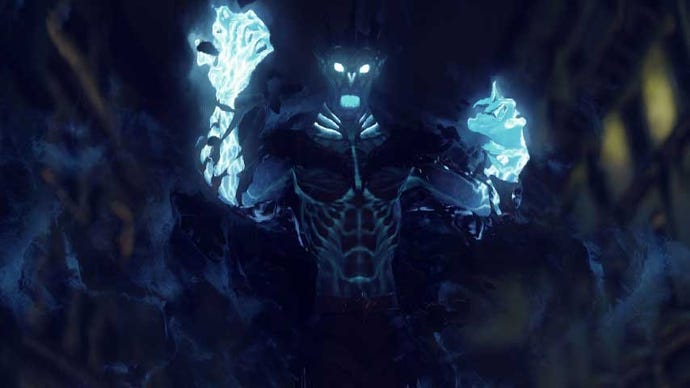Shadow Realms' cancellation makes a lot of sense
Shadow Realms was probably cancelled because EA doesn't care about free-to-play games any more. That and it wasn't very good.
So let's talk about Shadow Realms.
Given the green light process EA and many other publishers employ, I have no doubt that hundreds of promising game ideas are shelved each year. The majority won't even make it beyond verbal pitches. Some would have been prototyped. Very, very few make it into the public eye before they are cancelled.
There are a lot of good reasons for this process, not the least of which is disappointed backlash in response to a cancellation. There are probably some bad reasons, too, if you'd like to have a discussion about how tightly games PR is locked down. EA struggles with the whole openness thing that is so popular nowadays; it shows us little videos of games in development, but it still maintains a robust wall of silence. I'm not sure a series of public cancellations will encourage it to change its ways, either.
So why was Shadow Realms cancelled? I suspect it's a combination of factors: EA's sinking boner for non-traditional games publishing and, well, a game that just wasn't very good.
Before we get into that, though, let's talk about why Shadow Realms got as far as it did, and why it seemed so exciting.
The Secret World meets Mass Effect 3
BioWare build great worlds. It tells great stories in other people's settings, but both Mass Effect and Dragon Age show the developer can create compelling, complicated universes and fill them with great stories and characters.
Shadow Realms was a new original BioWare world. Inspired by the success of young adult and paranormal properties over the past few decades, it would have featured young, relatable human beings thrust into the clash of two worlds - ours, and a fantasy realm.
"It's just like real life but you have magic powers" is a compelling setup. The Secret World has a kind of similar approach, and players who enjoy recreating themselves in-game, or creating elaborate but believable fantasies, love it. BioWare does a great job of supporting character customisation and self-expression, and there's no reason to think this one would have been different; Shadow Realms was reportedly going to include the option to make a transgendered character and real world brands, the latter of which would have been a nice source of microtransactions.
The team's storytelling chops would have been leveraged to create a world you could invest in as much as you liked, via a series of live-action shorts. I suspect this would have been supplemented with various transmedia offerings as well as in-game events.
So that sounds like fun, and there's a good reason why Evolve and Fable Legends won strong publisher support: 4v1 makes for interesting group gameplay, and hasn't been exploited enough in modern gaming. With Dragon Age, BioWare invited you into a pen-and-paper role-playing group, to enjoy the stories it told there. With Shadow Realms, it encouraged you to make your own group, but one focused on the combat, character building and loot cycle, player versus DM style. Old school. Nice.
EA obviously though this sounded pretty good, and it had an excellent comparable to base its investment on: Mass Effect 3. The shooter RPG's multiplayer suite was a gamble that more that paid off, and resulted in a long series of free expansions. The business model was popular with fans, too; you could earn plenty of in-game currency to buy the randomised boxes of goodies which were otherwise purchasable with real money. That was it.
What an excellent recipe! So what went wrong? Two things.
EA went cold
Shadow Realms must have been in the works for quite some time before we ever got a sniff of it, and the EA that threw money at a free-to-play, online multiplayer BioWare IP is not the same EA that cancelled it.
All publishers change over time, of course, as the industry adapts and changes to new technologies, new consumer preferences and business pressures. EA, though, has had a pretty dramatic change: former CEO John Riccitiello was replaced by Andrew Wilson.
We've seen several new behavioural patterns since this happened: EA has shortened its PR cycles, become far more willing to delay major projects, refocused on core triple-A games, and shut down several free-to-play projects - Command & Conquer and Dawngate.
There's the kicker: EA under Wilson is totally willing to shut down projects publicly, and isn't interested in pursuing new kinds of publishing on the PC. That's not to say it won't keep bringing its big triple-A games to PC, because it certainly will, but it's no longer interested in trends like free-to-play, social, MOBA and what-not, which are at home on PC.
Wilson leads an EA that made Shadow Realms public in a corporate culture of cooling ardour towards the kind of experimentation it was built around - and an EA that will cancel projects out of hand if they won't live up to its new, exacting standards.
It was probably balls
I didn't get a chance to play Shadow Realms, and neither did most of you, since it never even made it to public alpha. Lots of other people did, though, at gamescom 2014, both in press previews and at the test kiosks on the show floor.
Hype did not go through the roof, as it would have after a similar public showing of Dragon Age or Mass Effect. That's natural, given Shadow Realms was a new property and a new kind of game, but it was still a bit of a shock for those with an interest in BioWare to see one of its games sort of go under the radar.
A recent Unseen64 report, allegedly produced with the help of development staff, hinted that internal reception to the project wasn't warm, and feedback from private and public tests was tepid. The gameplay was allegedly criticised the most, as being just not very interesting.
This is entirely possible, and I would go so far as to say it is probable, and I think we have another comparable here - Dragon Age: Inquisition. The Mass Effect 3 multiplayer formula was also applied here, and although EA hasn't given us any reason to believe it hasn't been super popular, well - there hasn't been a lot of fuss made over ongoing development and content drops to the extent that Mass Effect 3 was publicised.
BioWare just couldn’t nail it this time around. Maybe with more time it would have got there, but that was not time EA was willing to grant, when it could be investing in core pillar triple-A games for consoles.
Personally, I didn't much enjoy Dragon Age: Inquisition's multiplayer. I kind of wanted to collect 'em all, and putting together effective party builds with friends was great, but the moment to moment gameplay felt like a grind. Walk through linear level, use same tactics on everything, rinse, repeat. Dull.
Shadow Realms would have had the advantage of player creativity in the Shadow Lord role to liven things up, but if the combat wasn't crunchy - you know what I mean - it wouldn't have worked out. Mass Effect 3's multiplayer was built onto the foundation of a solid, refined combat experience. I believe Shadow Realms was designed as a cool multiplayer concept first, with the actual gameplay prototyped later.
This probably happens a lot in games development, and can even be successful, but I suspect BioWare just couldn't nail it this time around. Maybe with more time it would have got there, but that was not time EA was willing to grant, when it could be investing in core pillar triple-A games for consoles.
I'm disappointed Shadow Realms won't see the light of day, because it sounds like a world I'd really like to explore. I'm sorry for the creators who poured their hearts into it, and I hope they find satisfaction in new projects. But this is the reality of the industry, I guess; this sort of thing goes on constantly. I'm just glad EA opened up a bit to let us have a look at it on the way. The More You Know.
















